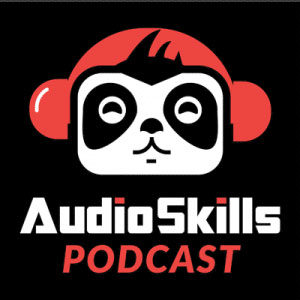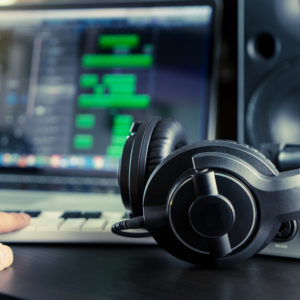 Scott Hawksworth runs a site called AudioSkills that is dedicated to helping folks record and produce music in their home studios. He also produces a podcast. His most recent guest on the podcast was none other than yours truly :-).
Scott Hawksworth runs a site called AudioSkills that is dedicated to helping folks record and produce music in their home studios. He also produces a podcast. His most recent guest on the podcast was none other than yours truly :-).
I’ve been focusing a lot on helping folks get a professional sound from home studios as early in the recording process as possible. This is typically BEFORE they ever get to the music mixing phase.
It’s all about capturing and editing the sounds at the very beginning of the production process in such a way that the audio audio is clean and free from the typical telltale signs of “audio recorded in a bedroom” – things like echo-y room noise, background noise, “thin” sounding vocals, etc.
This is obviously important for both musicians AND the voice over folks. In fact, it’s even more important for the VOs because without music in the background, the audio on voice over recordings cannot suck for even a second. So the better the quality you can capture and create up front, the more professional your audio will sound.
So the topic of Scott’s latest podcast, “Getting Pro Sound from Home with Ken Theriot,” was apt and timely. You can find that podcast episode here: https://audioskills.com/episode/5974/.
BTW, he mentions my free download (eBook with videos) called “6 Mostly Free Tips for Making Your Audio Sound Expensive.” Just click that link to get your free copy.
Thanks for having me on your show, Scott! Best of luck with the site!
Archives for February 2018
How To Give Your Guitars And Vocals Their Own Space In The Mix
Flippo Medas a regular contributor Home Studio Musicians – Audio Issues Audience, shared an amazing trick for those of you trying to create separation between the guitars and vocals.
” I think I just “discovered” a way to get both guitars and voice to have their own space when they risk masking each other. ”
Sidechaining is a great technique for adding subtle motion between the guitarist and the singer. So instead of setting the guitar aside every time the vocalist sings you give them their own spaces. By carving out a broad cut in your EQ in the guitar giving your vocals dominance.
Read more here: https://www.audio-issues.com/music-mixing/give-guitars-vocals-space-mix/
Learn How To Make Music For Other People With Our Top 10 Tips
If you want to produce music for TV, films, or games, there is a lot you need to know to get up to speed, including how to design your own tracks using the latest software technology from companies like Zero-G, Spitfire, and iZotope. Be sure to have a comprehensive arsenal in your studio of all of the hardware and software you need to turn your audio vision into a reality in the moment. Develop a thick skin. Realize that when you are making music for someone else, they will criticize it and even reject it often.
Key Takeaways:
- Firstly you need to give yourself deadlines and stick to them, it may just motivate you to work harder
- Attempt to explore sound design and create your own samples using tools like Spitfire, Zero-G, and more
- Know that making music for others won’t always be fun but don't forget to try and innovate to get noticed
“If you’re making music for other people, it won’t always be fun (though it will be sometimes, we promise).”
Read more: http://www.musictech.net/2018/01/10-tips-to-make-music-for-other-people/
How Important Are Headphones In Your Studio?

A common mistake for most musicians, engineers and producers is to disregard the real value of headphones in the studio. The truth is you can go cheap in other areas but not on your headphones. Because good quality headphones will bring your recording further than another flashy compressor.
Of course this is primarily for music recording. for voice over folks, headphones are much less important except when doing your final edits.
But when recording and mixing music, headphones are absolutely required when overdubbing. But the rule-of-thumb has always been to put the headphones away when it comes time for mixing and mastering. It is considered much better to rely on monitor speakers.
That’s great if your listening room is acoustically great. But when recording in a square spare bedroom that is not treated with acoustic materials like a lot of us, the value of monitor speakers diminishes. The sound you hear will be distorted by the imperfect room. So in that case good accurate headphones are super important to get accuracy in the mix. After that, I highly recommend listening on multiple other speakers, like the entertainment center, Alexa, and your car. Take notes and go back to the mix.
Rinse and repeat until your mix sounds good everywhere.
Read more about the value of headphones in a studio here: https://theproaudiofiles.com/headphones-in-the-studio/
Don't Settle For Just A Little Mastering
When it comes to mastering knowing is never too much, because doing with just a little knowledge can lead to bad habits eventually leading to disaster.
Such practices result in bad quality and the musicality of recordings in general over the last few years. Especially today with all the tools available out there knowing just a little can take further away from your dream.
Mixing is not equal to mastering, now this may involve processes that one has to learn and must go thru to come up with great results. Mastering is a different stage apart from mixing although they work hand in hand they are different.
Read more here: https://ask.audio/articles/why-just-a-little-mastering-knowledge-can-be-dangerous